Seiichi Yoshida's Diary of Comet Observations (2025)
|
Japanese version Home page |
Updated on November 24, 2025 |
![]()
![]()
|
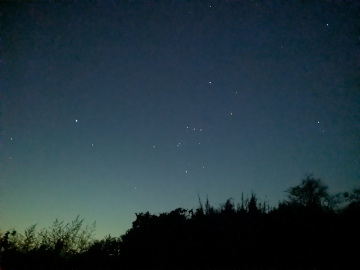 |
I observed 4 comets visually on Nov. 20 in Mt. Tsukuba, Ibaraki, Japan.
Finally I could see visually an interstellar comet 3I/ATLAS. It is really amazing experience! A comet with eccentricity over 6 and total magnitude of 9 mag must be once in a lifetime, or maybe once in a history.
C/2025 K1 ( ATLAS )
9.8 mag Dia. 2.5' DC 3 Tail 9' (p.a. 295 deg) (40.0-cm reflector 36x)
Evidently elongated. Looks cool with a long tail. But the central condensation is weak and it looks like a remnant of disintegrated comet. I tried to see the split nucluus into three pieces with 257x magnification, but I could not see each components.
24P/Schaumasse
12.0 mag Dia. 1.7' DC 1 (40.0-cm reflector 144x)
Diffuse.
235P/LINEAR
fainter than 13.5 mag Dia. 0.6' (40.0-cm reflector 257x)
Ken-ichi Kadota reported it as 13-mag, so I tried to observe it visually. But it was not visible.
3I/ATLAS
9.3 mag Dia. 3.5' DC 5 (40.0-cm reflector 36x)
I could see an interstellar comet for the first time. Large and bright. I looks like an ordinary comet visually.
|
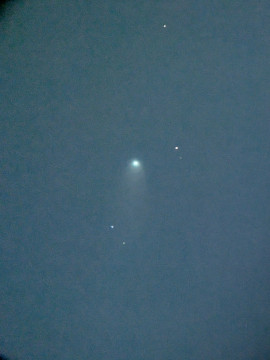 |
I observed 3 comets visually on Nov. 2 in Mt. Hanadate, Ibaraki, Japan.
Due to the strong moon light and thin clouds, the condition was not good.
C/2025 A6 ( Lemmon )
4.4 mag Dia. 6' DC 7-8 Tail 0.6 deg (p.a. 55 deg) (10x70 monocular)
Nice view with a fine tail, although the tail did not look long due to the thin clouds.
C/2025 R2 ( SWAN )
8.1 mag Dia. 3' DC 3 (40.0-cm reflector 36x)
Hard to see due to the strong moon light. But I could see the comet is large.
C/2025 T1 ( ATLAS )
10.4 mag Dia. 2.0' DC 2 (40.0-cm reflector 144x)
Diffuse and weakly condensend.
|
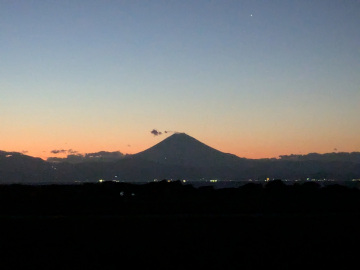 |
I observed C/2025 A6 visually on Nov. 1 in Miura City, Kanagawa, Japan.
It was completely cloudy in daytime, but the weather became fine rapidly in the evening.
C/2025 A6 ( Lemmon )
4.3 mag Dia. 7' DC 7-8 Tail 1.0 deg (p.a. 50 deg) (10x66 monocular)
Very nice view with a fine tail.
|
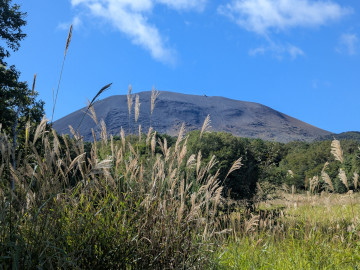 |
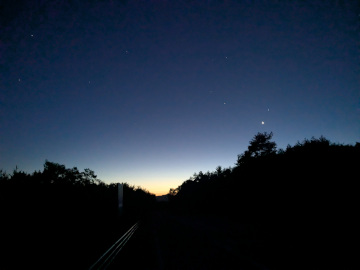 |
I observed 5 comets visually on Sept. 21, in Kita-karuizawa, Gunma, Japan.
Although it was almost cloudy in the evening, the weather became find very rapidly during the twilight. Mars in the low sky was easily visible. But unfortunately, C/2025 R2 ( SWAN ) was behind the mountains and I could not see it.
Then clouds came again, and I could not see the interstellar comet 3I/ATLAS, either.
The weather was find and clear in the morning.
C/2022 N2 ( PanSTARRS )
14.0 mag Dia. 0.8' DC 3 (40.0-cm reflector 144x)
Faint and small.
C/2024 E1 ( Wierzchos )
13.1 mag Dia. 1.3' DC 3-4 (40.0-cm reflector 144x)
Easier to see than expected.
C/2025 A6 ( Lemmon )
8.5 mag Dia. 4.0' DC 6 (40.0-cm reflector 36x)
8.1 mag Dia. 5' DC 7 (10x70 monocular)
Bright and easily visible!
240P/NEAT
14.2 mag Dia. 0.5' DC 2 (40.0-cm reflector 257x)
Diffuse, hard to see.
414P/STEREO
fainter than 12.6 mag Dia. 0.5' (40.0-cm reflector 144x)
It located near Venus and easy to guide the telescope. But the comet was not visible.
|
 |
 |
 |
 |
I observed C/2024 G3 ( ATLAS ) visually on Jan. 16 in Katahama coast, Numazu City, Shizuoka, Japan.
Finally I could see Comet C/2024 G3 ( ATLAS )! It looks cool, bright sharp comet in the evening dusk sky. I succeeded to take the photo with my smart phone.
There are large clouds in the west. I could see the comet only during three minutes, from 17:33 when the comet appeared from the cloud, to 17:36 when the comet set in the horizon. It was very lucky there was narrow clear sky between clouds and horizon.
C/2024 G3 ( ATLAS )
about -1.5 mag DC 8 Tail 0.3 deg (p.a. 75 deg) (10x66 monocular)
I estimated the brightness using Altair and gamma Aql. The comet was -1.5 mag, the second brightest comet in my life next to C/2006 P1 ( McNaught ). However, in my impression, Comet Tsuchinshan-ATLAS last year was much greater.
![]()
|
Go to Seiichi Yoshida's Diary of Comet Observations in 2024. |
![]()